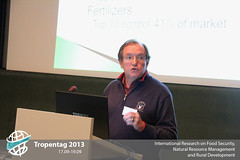The only continuum is the one of exploitation and poverty!
The session started of with an awakening keynote speech from FIAN
President Dr. Flavio Luiz Schieck Valente. He asked researchers to use science to influence politics, because politicians have an impact on people’s lives. His presentation did not focus on the continuum as such, but rather on what actually happens to the people in the continuum?







Comments
Post new comment